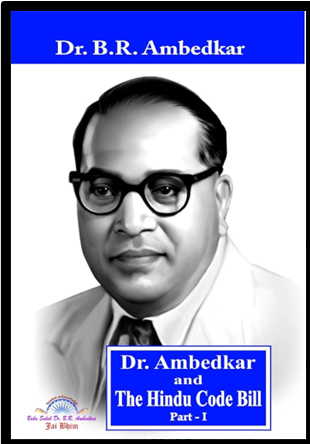“AMBEDKAR’S LEGACY: THE FORGOTTEN HINDU CODE BILL”
Syllabus:
- GS-2-Role of great leaders like DR Ambedkar , Constitution making and post independent India
Focus :
- The debate over Hindu code bill and contribution of Dr Ambedkar.
- Recognition of Dr. B.R. Ambedkar’s pivotal role in drafting the Indian Constitution.
Source-TH
Introduction
- B. R. Ambedkar prepared the bill to change Hindu rules that allowed divorce, forbade, polygamy, and granted daughters the right to inherit.
- Generally,overlooked contribution to the Hindu Code Bill, aimed at reforming Hindu personal laws.
Challenges and Discrimination Faced by Ambedkar
- Early experiences of caste discrimination and untouchability.
- Struggles for accommodation and basic rights despite academic achievements.
- Defiance and Advocacy for Social Reform
- Public acts of defiance against caste-based oppression, including the burning of Manusmriti.
- Leadership in satyagraha movements, such as the Kalaram temple satyagraha.
| About DR Ambedkar :
Early Life and Education:
Social Reforms and Activism:
Political Career:
Contributions to Education:
Religious Conversion and Philosophy:
Organisations:
Legacy and Recognition:
|
Initiatives for Hindu Code Bill
- Vision for restructuring Hinduism based on principles of equality and social justice.
- Appointment of Sanskrit scholars and consultations with religious pundits.
Challenges and Opposition
- Enthusiastic support from Jawaharlal Nehru followed by resistance within the Congress and opposition from groups like the Ram Rajya Parishad.
- Cold feet from Nehru and shelving of the Hindu Code Bill in Parliament,Subsequent Adoption and Implementation
- Nehru’s adoption of the Hindu Code Bill’s contents as separate laws.
- Enactment of the Hindu Marriage Act, Hindu Succession Act, Hindu Minority and Guardianship Act, and Hindu Adoptions and Maintenance Act.
Reflections on Ambedkar’s Legacy
- Contemplation on the rejection of Ambedkar’s proposed law and its implications.
- Exploration of Ambedkar’s conversion to Buddhism and its possible connection to caste prejudice.
Conclusion
- Importance of remembering Ambedkar’s contribution to the Hindu Code Bill alongside his role in drafting the Constitution.
- Reflections on the ongoing relevance of his advocacy for social reform and equality.
Source:Indian Express
Mains Practice Question :
GS-2
“Discuss Dr. B.R. Ambedkar’s contribution to the Hindu Code Bill and its significance in the context of social reform in India. Evaluate the challenges he faced in advocating for legal reforms aimed at addressing caste-based discrimination and untouchability.”(250 words)





